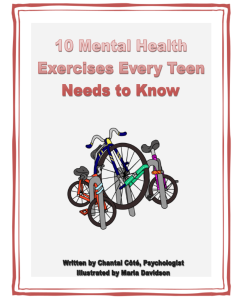4 Waysto Have Fun Even With Exam Stress (for teen girls)
4 Ways to Have Fun With Exam Stress (for teen girls)
Exam stress is real….and this blog shares some practical ways that could help normalize this experience and make it fun!
>>> FREE DOWNLOAD: Mental Health Handbook for Teen Girls <<<
An eBook with 10 mental health exercises every teen girl needs to know to:
- Improve focus
- Boost happy hormones naturally
- Cope with trick feelings
- Develop self-compassion

Photo by Naveen Kingsly on Unsplash
4 Ways for Teen Girls to Have Fun During Exam Stress
#1 – Normalize exam stress- Its important to note that exam season in itself is stressful, can promote worry, tension in relation to being in a test taking situation. It is normal to feel stress related to upcoming texts or exams which could also serve as a motivation to do your best, by being prepared. Could be tailored into “good stress”. Nonetheless, exam stress might as well trigger depression and anxiety, affect your eating and sleeping habits. If exam pressure and the taking of the exam in itself starts to take over your life, it would best to let others know, so you can be best supported as needed.
#2 – Do what makes you happy. Everyone has a way of managing stress or have tools that help them cope in stressful situations. These could include but not limited to, taking breaks in between study sessions, listening to music, going for a walk, having a change of scenery, watching a YouTube video, watching your favourite show, comedy, going through a bunch of memes, exercising, giving into your cravings, doodling and meditating. Engaging in suitable self-care could help, such as ensuring you are eating regularly, and you are keeping up with your sleep hygiene patterns.
#3 – Talk about exam stress with your peers, classmates, and friends. You might find that others might be experiencing or going through similar range of emotions as you are, when it comes to exams. They say, “a problem shared is a problem half solved”. This might not make you feel better but helps you understand that you are not alone. You have a tribe of other individuals experiencing similar things that you can actually relate too. Also, you might learn one or two things that could be of help in assisting you cope.

Photo by Alexis Brown on Unsplash
#4 – You could join or create a study group- Working with and being a part of a study group could help boost your confidence in nailing your exams, by being able to practise exam questions together, get and share different perspectives on possible exam questions, laugh, cry together and hence build momentum to keep you going.
Also understand that this is a learning experience, doing your best whatever that looks is good enough.
Love,
Chipo
Register Social Worker offering counseling for female identifying teens (11-21 years old)
>>> FREE DOWNLOAD: Mental Health Handbook for Teen Girls <<<
An eBook with 10 mental health exercises every teen girl needs to know to:
- Improve focus
- Boost happy hormones naturally
- Cope with trick feelings
- Develop self-compassion
 I am a registered social worker with a Bachelor of Social Work with a major in psychology from the university of the Western Cape, and a Master’s in Clinical Social Work specialization with individuals, families, and groups from the University of Calgary.
I am a registered social worker with a Bachelor of Social Work with a major in psychology from the university of the Western Cape, and a Master’s in Clinical Social Work specialization with individuals, families, and groups from the University of Calgary.
In my practice, I note the different intersectionalites that come into play, and I have adapted myself to understanding the effects thereof. I pride myself in working from a holistic and integrative approach using trauma-informed, anti-oppressive, and intersectional lenses in rendering services.
I am grounded by embracing my full humanness-being imperfectly perfect. My faith, family and friendships carry me through life and its happenings. I find being in nature very healing and so is savouring moments. When not working, I love to engage in some fitness, going on walks, journaling, catching up on Korean series, city adventures and reading for pleasure. I also believe in allowing my inner child come out sometimes through art, dancing, building sand castles you name it.













 experiencing depression, in order to be there for her for the long haul, you’ll want to ensure you’re in a good place, filling your cup consistently, so you
experiencing depression, in order to be there for her for the long haul, you’ll want to ensure you’re in a good place, filling your cup consistently, so you  I have heard things like:
I have heard things like:























